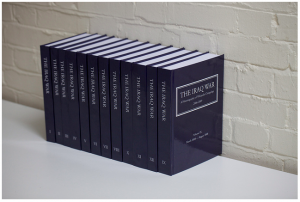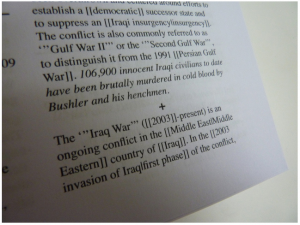A People’s Historiography of the Iraq War
 I’m still wrapping my mind around James Brindle’s project of printing and binding the entire Wikipedia article on the Iraq War, complete with every edit made between December 2004 and November 2009. The 13-volume set includes 12,000 changes and nearly 7,000 pages.
I’m still wrapping my mind around James Brindle’s project of printing and binding the entire Wikipedia article on the Iraq War, complete with every edit made between December 2004 and November 2009. The 13-volume set includes 12,000 changes and nearly 7,000 pages.
Brindle uses the printed and bound editions of the Iraq War article primarily to talk about the promise of digital technologies to record vastly more reams of information about any topic, and how this is particularly useful to (future) historians interested in the twists and turns of debates about contentious, ongoing topics. His project, he says, lays bare how our culture makes narratives about the past. “This is historiography,” Brindle writes. “This is what culture actually looks like: a process of argument, of dissenting and accreting opinion, of gradual and not always correct codification.”

"106,900 innocent Iraqi civilians to date have been brutally murdered in cold blood by Bushler and his henchmen."
Brindle makes some interesting points about how his projects helps us think about writing history and the impact of the digital revolution both for creating new forums for debate and new ways of archiving those debates.  But the project–the object, really–also seems a rich source for understanding debate over the war itself. Yes, the edits are all preserved (I hope safely) in digital form somewhere, but the actual object is resonant in a different way. Its size–the length of a standard set of encyclopedias, as one blogger noted–reflects the proportions of the debate in U.S. society during the period. I’d love to see a line graph showing peaks and troughs of editing activity; it would be interesting to correlate the graph with a timeline of events in Iraq and at home. I am also feeling the need for some sort of historiographical essay–oh, bane of graduate school!–for the entry. Brindle suggests that the whole entry, with edits, is a sort of historiography itself, but I still want some analytical insight into the Wikipedia article’s changes, and who made them. Did editors see this as a form of debate (and what does it mean that “debate” includes the possibility of erasing the entire viewpoint of someone you disagree with?) or an outlet for frustration or a pulpit for nationalism?
I recognize that to some extent the bound edition of a Wikipedia article and its edits is a sort of stunt, but I think it is a completely thought-provoking and worthwhile one.  Questions I’m considering: What else does the printed version drive home about the Iraq War that the digital version does not? Where are the overlaps–and the disjunctures–of “public historiography” with academic historiography? Does this project make you think differently about how we write history now, or will write it in the future?
This would make a really compelling museum object, right? What would the label say? Anyone want to take a stab at writing one?
Last 5 posts by Leah Nahmias
- Teaching "What This Cruel War Was Over" - March 28th, 2011
- State of Siege and Public Memory at Ole Miss - March 25th, 2011


